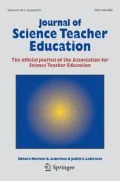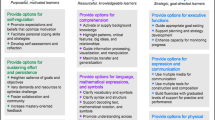Abstract
This paper describes the use of a three-circle Venn diagram as a vehicle for introducing pre-service elementary teachers to pedagogical content knowledge (PCK). Each circle of the diagram represents pedagogy, content and context individually. The overlap of any two circles represents the interaction between the circles. For example, the overlap of pedagogy and context relates to the ways that each of these general topics influences the other. The overlap of all three circles represents a complete lesson that is an integration of the three major components of PCK. The Venn diagram is an easily remembered graphic illustration of PCK that can be useful in planning lessons. The use of this graphic organizer in a science capstone course required of all pre-service elementary teachers is described.



Similar content being viewed by others
References
Aaltonen, K., & Sormunen, K. (2003). Describing the development of PCK in science teacher education. Paper presented in the Fourth Conference of European Research Association of Science Education. 19–23 August 2003, Nordvijeknhout, the Netherlands.
Abell, S. K. (2008). Twenty years later: Does pedagogical content knowledge remain a useful idea? International Journal of Science Education, 30(10), 1405–1416.
Abell, S. K., Park Rogers, M. A., Hanuscin, D. L., Lee, M. H., & Gagnon, M. J. (2009). Preparing the next generation of science teacher educators: A model for developing PCK for teaching science teachers. Journal of Science Teacher Education, 20(1), 77–93.
Appleton, K. (2006). Science pedagogical content knowledge and elementary school teachers. In K. Appleton (Ed.), Elementary science teacher education: International perspectives on contemporary issues and practice (pp. 31–54). Mahwah, NJ: Lawrence Erlbaum.
Appleton, K. (2008). Developing science pedagogical content knowledge through mentoring elementary teachers. Journal of Science Teacher Education, 19(6), 523–545.
Bencze, L., Hewitt, J., & Pedretti, E. (2001). Multi-media case methods in pre-service science education: Enabling an apprenticeship for praxis. Research in Science Education, 31(2), 191–209.
Burn, K., Childs, A., & McNicholl, J. (2007). The potential and challenges for student teachers’ learning of subject-specific pedagogical knowledge within secondary school subject departments. The Curriculum Journal, 18(4), 429–445.
Bybee, R. W. (2000). Teaching science as inquiry. In J. Minstrell & E. H. van Zee (Eds.), Inquiring into inquiry learning and teaching in science (pp. 20–46). Washington, DC: American Association for the Advancement of Science.
Carlsen, W. S. (1999). Domains of teacher knowledge. In J. Gess-Newsome & N. G. Lederman (Eds.), Examining pedagogical content knowledge: The construct and its implications for science education (pp. 133–144). Boston: Kluwer.
Clermont, C. P., Borko, H., & Krajcik, J. S. (1994). Comparative study of the pedagogical content knowledge of experienced and novice chemical demonstrators. Journal of Research in Science Teaching, 31(4), 419–441.
Cochran, K.F., King, R.A., & DeRuiter, J.A. (1991). Pedagogical content knowledge: A tentative model for teacher preparation. East Lansing, MI: National Center for Research on Teacher Learning. (ERIC Document Reproduction Service No. ED340683).
De Jong, O. (2000). The teacher trainer as researcher: Exploring the initial pedagogical content concerns of prospective science teachers. European Journal of Teacher Education, 20(2), 127–137.
De Jong, O., & Van Driel, J. (2004). Exploring the development of student teachers PCK of the multiple meanings of chemistry topics. Journal of Science and Mathematics Education, 2(4), 477–491.
Gess-Newsome, J. (1999). Pedagogical content knowledge: An introduction and orientation. In J. Gess-Newsome & N. G. Lederman (Eds.), Examining pedagogical content knowledge: The construct and its implications for science education (pp. 3–17). Boston: Kluwer.
Grossman, P. L. (1990). The making of a teacher: Teacher knowledge and teacher education. New York: Teachers College Press.
Gunstone, R. F., & White, R. T. (1986). Assessing understanding by means of Venn diagrams. Science Education, 70(2), 151–158.
Halpern, D. (1992). A cognitive approach to improving thinking skills in the sciences and mathematics. In D. Halpern (Ed.), Enhancing thinking skills in the sciences and mathematics (pp. 1–14). Hillsdale: Erlbaum.
Hume, A., & Berry, A. (2011). Constructing CoRes-a strategy for building PCK in pre-service science teacher education. Research in Science Education, 41(3), 341–355.
Loughran, J., Berry, A., & Mulhall, P. (2006). Understanding and developing science teachers’ pedagogical content knowledge. Rotterdam, The Netherlands: Sense Publishers.
Loughran, J., Mulhall, P., & Berry, A. (2004). In search of pedagogical content knowledge in science: Developing ways of articulating and documenting professional practice. Journal of Research in Science Teaching, 41(4), 370–391.
Magnusson, S., Krajcik, J., & Borko, H. (1999). Nature, sources and development of pedagogical content knowledge for science teaching. In J. Gess-Newsome & N. G. Lederman (Eds.), Examining pedagogical content knowledge: The construct and its implications for science education (pp. 95–132). Boston: Kluwer.
Marzano, R., Pickering, D., & Pollack, J. (2001). Classroom instruction that works: Research-based strategies for increasing student achievement. Alexandria, VA: ASCD.
Michigan Department of Education. (2009). Science grade level content expectations. Retrieved from http://www.michigan.gov/documents/mde/Complete_Science_GLCE_12-12-07_218314_7.pdf.
Moore, D. W., & Readence, J. E. (1984). A quantitative and qualitative review of graphic organizer research. Journal of Educational Research, 78(1), 11–17.
Nilsson, P. (2008). Teaching for understanding: The complex nature of pedagogical content knowledge in pre-service education. International Journal of Science Education, 30(10), 1281–1299.
Otto, C., Luera, G., & Everett, S. (2009). An innovative course featuring action research integrated with unifying science themes. The Journal of Science Teacher Education, 20(6), 537–552.
Park, S., & Oliver, J. S. (2008). Revisiting the conceptualization of pedagogical content knowledge (PCK): PCK as a conceptual tool to understand teachers as professionals. Research in Science Education, 38(3), 261–284.
Robinson, D., & Kiewra, K. (1995). Visual argument: Graphic organizers are superior to outlines in improving learning from text. Journal of Educational Psychology, 87(3), 455–467.
Shulman, L. S. (1986). Those who understand: Knowledge growth in teaching. Educational Researcher, 15(2), 4–14.
Sneddon, I. N. (Ed.). (1976). Encylopaedic dictionary of mathematics for engineers and applied scientists. Oxford: Pergamon.
Speigel, G. F., Jr, & Barufaldi, J. P. (1994). The effects of a combination of text structure awareness and graphic postorganizers on recall and retention of science knowledge. Journal of Research in Science Teaching, 31(9), 913–932.
Sperandeo-Mineo, R. M., Fazio, C., & Tarantino, G. (2006). Pedagogical content knowledge development and pre-service physics teacher education: A case study. Research in Science Education, 36(3), 235–268.
Thompson, J., Licklider, B., & Jungst, S. (2003). Learner-centered teaching: postsecondary strategies that promote “thinking like a professional”. Theory into Practice, 42(2), 133–139.
Trowbridge, J.E. & Wandersee, J.H. (2004). Chapter 4. Theory-driven graphic organizers. In J.J. Mintzes, J.H. Wandersee and J.D. Novak (Eds.), Teaching science for understanding: A human constructivist view (pp. 93-128). San Diego, CA: Academic Press.
Van Driel, J. H., de Jong, O., & Verloop, N. (2002). The development of pre-service chemistry teachers’ pedagogical content knowledge. Science Education, 86(4), 572–590.
Zembal-Saul, C., Starr, M. L., & Krajcik, J. S. (1999). Constructing a framework for elementary science teaching using pedagogical content knowledge. In J. Gess-Newsome & N. G. Lederman (Eds.), Examining pedagogical content knowledge: The construct and its implications for science education (pp. 237–256). Boston: Kluwer.
Acknowledgment
The authors wish to thank Adrianna Soranno (lunar phases) and Hanadi Hourani, Justina Kish and Kristen Regits (plants) for permission to use their Venn diagrams in this article.
Author information
Authors and Affiliations
Corresponding author
About this article
Cite this article
Otto, C.A., Everett, S.A. An Instructional Strategy to Introduce Pedagogical Content Knowledge Using Venn Diagrams. J Sci Teacher Educ 24, 391–403 (2013). https://doi.org/10.1007/s10972-012-9272-5
Published:
Issue Date:
DOI: https://doi.org/10.1007/s10972-012-9272-5




